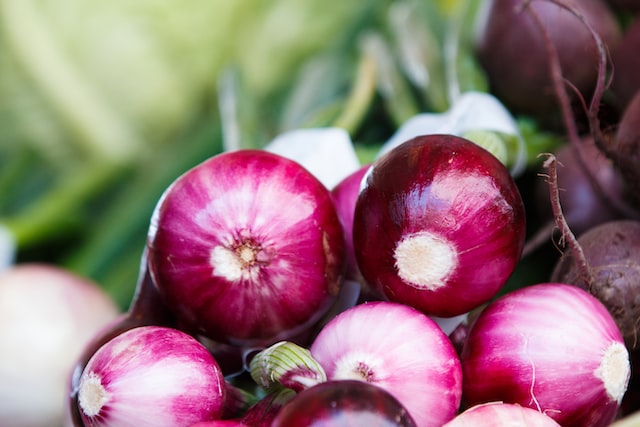Whether fried or eaten in salads, onions make some of the world’s best vegetables due to their many health benefits. Although often overlooked for their smell and harshness making eyes water when being cut, the health benefits of onions are not to be overlooked.
Onions add flavor, color and textures to a wide variety of cuisines. Even in ancient times, many early physicians recommended this vegetable for a series of illnesses. Everybody heard the saying “an apple a day keeps the doctor away”, but did anyone hear about how eating habits which include onions can keep colds away?
Onions: A Short History
Onions have been attributed to human use as back as the Bronze Age. Remains of this vvegetable have been found in archeological sites dating back to 5000 BC. Egyptians were one of the oldest civilizations know to grow onions around 3500 BC. They also appear in the Vedic writings from India dating more than 1100 years BC. Alongside beans and cabbage, onion became a regular in European diet starting with the Middle Ages.
Roman naturalist Pliny the Elder believed onions could cure poor vision, induce sleep and heal toothaches, dog bites and mouth sores.
Columbus is known to introduce onions to North America in 1492 during his expedition to Hispaniola. Regardless, Pilgrims are known to have found strains of wild onions growing throughout North America. Native American Indians are also known to have use this vegetable in many ways.
Some of the worlds leading onion producers nowadays are China, India, Egypt, Iran and the United States of America.
What are the Health Benefits of Onions?
Being part of the Allium family, such as garlic, onions contain sulfur which gives its distinctive smell. Most onion contain 89% water, 4% sugar, 2% fiber, 1% protein and less than 1% fat.
In addition, it has been proven that onions are rich in phytochemical compounds such as phenolics and flavonoids. There have been ample studies which show that a regular consumption of this vegetable help prevent diseases such as cardiovascular illnesses and cancer. These epidemiological studies proven that regular intake of onions and fruits prevent these chronic diseases, due to their high antioxidant content.
Depending on the strain of onion used, the content of dietary flavonoids may depend. For example, Western Yellow strain presents to contain the highest quantity of flavonoid level (69.2 ± 3.7 mg/100 g of onion) as opposed to the Western White.
Immune System
In addition to protecting the body from outside agents, due to its concentration of polyphenols, onions are regarded to create a strong immune system especially for people suffering from a wide-range of allergies. These is due in part because of quercetin, which reduces allergic reactions. The histamines, which are produced by our bodies, are the ones responsible of making us sneeze, cry and itch in case of an allergic reaction. Onions prevents the creation of histamines in our bodies.
Anti-inflammatory
According to a 1990 study in the journal International Archives of Allergy and Applied Immunology, onions have anti-inflammatory properties due to its concentration of sulfur. Quercetin may also provide relief for those suffering from asthma as it relaxes the airway muscles.
Heart
Onions help lower blood pressure as well as heart attack risks. The journal Thrombosis Research presented a study in 2002 showcasing that the sulfur in onions act as a natural blood thinner. This prevents blood platelets to make clusters, lowering the risk of heart attacks or strokes.
Cancer
The University of Maryland Medical Center exhibited one of their findings which stated that quercetin may inhibit cancer cells. Breast, colon, prostate, ovarian, endometrial and lung tumors being prevented by the intake of this vegetable. Studies in the Netherlands also showed that onions contain higher amounts of quercetin than tea or apples, which are high-quercetin sources as well. The strains of onions which contain the highest amount of quercetin are red, shallot and yellow onion.
Blood Sugar
The sulfur in onions is also known to increase insulin production thus lowering blood sugar. Alongside sulfur, chromium is also found in this wonder veggie which regulates blood sugar. As such, people who suffer from Type 1 and 2 diabetes that partake in the regular intake of this vegetable show lower glucose levels.
Digestion
The phytochemicals in onions reduce the risk of developing gastric ulcers. Moreover, the fiber in onions promotes good digestion.
Popular Onion Dishes
- Onion and Poppy Seed Bialys – originating from the Polish cuisine, this cousin of bagels offers great nutritional value and are soft and chewy, making it an excellent.
- Creamed Onion Gratin – surprisingly sweet, they are excellent with Gorgonzola cheese.
- Braised Onions – these pearl onions superbly blend with chicken and butter.
- Caramelized Onion Quiche – Tasty and creamy, it is accompanied by Gruyere cheese.
- Onion Potato Gratin – sliced with potatoes, it comes baked with onion, cream and Parmesan cheese.
- Pizza with Onions, Mushrooms and Ricotta – an easy recipe, excellent with Ricotta cheese, can be made using tortilla flour.
Although onions possess a vast array of chemicals which help us improve our general health, it is generally agreed that is best consume them raw. This is due mainly because they maintain their levels of sulfur, phytochemicals and quercetin when not altered by frying. So the best way to eat them is raw, in a salad, excellent alongside other assortments of vegetables and olive oils.
This concludes our article on the amazing health benefits of onions. For more articles on the many health benefits of fruits and vegetables be sure to check the Healthy Foods section. Feel free to leave us your comment on how you like onions to be cooked.
